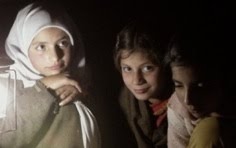 Stories are often told to teach simple yet powerful truths.
Stories are often told to teach simple yet powerful truths.One of my clients who had fallen into a pattern of obsessive worrying would show some progress and then get sucked down into a whirlpool of anxious despair – time and time again. This is what worrying is: trying to resolve problems that have not even had time to appear; imagining that things, when they do happen, will always turn out for the worst.
I once again saw the power of Storywork and Healing when we worked deeply with two stories that provided him with a more sustained breakthrough in his determination to overcome this troublesome pattern.
Here are the two stories. May they touch the minds and hearts of the worriers among you!
Maybe; maybe not
A Taoist tale tells of a poor but hard-working farmer who had worked his crops for many years, and managed to have a simple life. One day, the only horse he owned ran away, Hearing the news his neighbors came to sympathize: “What terrible luck!” to which he answered “Maybe; maybe not.”
A Taoist tale tells of a poor but hard-working farmer who had worked his crops for many years, and managed to have a simple life. One day, the only horse he owned ran away, Hearing the news his neighbors came to sympathize: “What terrible luck!” to which he answered “Maybe; maybe not.”
The next day the horse returned, but with it were four other wild horses that the farmer tied up. “What good luck…” his neighbors exclaimed. The farmer replied to them: “Maybe; maybe not..”
Then the day after, his only son tried to clamber on and ride one of the wild, untamed horses and was thrown off and badly injured, breaking many bones, and unable to help the old farmer with any work. “This is truly awful!” his neighbors sighed. The farmer only said: “Maybe; maybe not..”
Some days later, officials came to the village and rounded up all the young men to fight a terrible battle for the ruler. The only young man they left behind was the farmer’s son. Naturally his neighbors told him how wonderful they thought things had turned out for him, but we can guess that this time they were not really surprised to hear him say: “Maybe; maybe not..”
Making a white horse fly
An angry king once condemned a man to the gallows. When the judge had finished reading the sentence, the condemned man begged to be allowed to approach the king, and requested him:
An angry king once condemned a man to the gallows. When the judge had finished reading the sentence, the condemned man begged to be allowed to approach the king, and requested him:
“Your Majesty, you are known throughout these lands as a wise man who is interested in everything that your subjects do. You learn from sages, snake-charmers and magicians. Well, I must tell you this -- when I was a child, my grandfather taught me how to make a white horse fly. Since there is no one else in the whole kingdom who knows how to do this, my life should be spared.”
The king immediately ordered a white horse to be brought before them. “To make this horse fly, I need two years working with the animal,” said the condemned man. “Very well, you will have two years,” replied the king, already somewhat suspicious. “But if this horse does fly at the end of this period, you will definitely be hanged.”
Overjoyed, the man left with the horse. When he reached his house, he found his whole family upset and in tears. “Are you mad?” his wife moaned, "How could you have made such a claim?”
“Don’t worry,” he said. “For one thing, no one has ever tried to teach a horse to fly, and the horse just might well learn. For another, the king is already very old and he might die within the next two years. And then again, the horse itself might die in which case I’ll be given another two years to teach the new horse … not to mention the possibility in the two years of revolutions, coups d’état and general amnesties. And even if nothing like this happens, and everything remains exactly as it is, I will still have gained two years of life in which I can do anything I like, and a strong and beautiful horse. Tell me, does that seem little to you?”
May you find stories that unlock doors for you.
Marguerite Theophil
Marguerite Theophil
Making a connection from one pattern to another
Wherever a story comes from,
whether it is a familiar myth or a private memory,
the retelling exemplifies the making
of a connection from one pattern to another:
a potential translation
in which narrative becomes parable
and the once upon a time comes to stand
for some renascent truth…
Our species thinks in metaphors
and learns through stories
~ Mary Catherine Bateson
